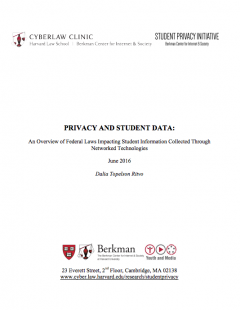
Privacy and Student Data
An Overview of Federal Laws Impacting Student Information Collected Through Networked Technologies
Over the past five years, schools have progressively been integrating the use of technology into the classroom, both to help students achieve their goals, and help teachers and administrators alike organize, categorize and track information about students. Specifically,“Networked Services” can be used in a variety of ways to improve school systems, including increasing efficiency in administrative operations to advancing individualized learning through online resources. Though these networked services may be valuable tools, they also have the ability to collect sensitive information about students. To that end, as educational institutions introduce networked services into schools, they must remain alert to growing privacy concerns for sensitive student information.
Harvard Law School’s Cyberlaw Clinic, based at the Berkman Center for Internet & Society, has prepared this guide to provide a high-level overview of two of the major federal legal regimes that govern the privacy of children’s and students’ data in the United States: the Family Educational Rights and Privacy Act and the Children’s Online Privacy Protection Act. In addition, this guide covers how the Protection of Pupil Rights Amendment, which, while not as broadly applicable to the use of technology by schools, does include a few provisions that can apply in certain contexts, particularly when schools use technology to administer surveys of student subjects, or use technology that collects information for marketing purposes. While there are other laws that may also apply to schools in this context (e.g. state privacy laws), these three laws have important implications for schools using networked services.
The purpose of this document is to provide schools, parents and students alike with an overview of some of the laws that may apply as schools begin to use networked services to help educate students. All of the relevant statutes – and particularly FERPA – are complex and are the subjects of large bodies of caselaw and extensive third-party commentary, research, and scholarship. This document is not intended to provide a comprehensive summary of these statutes, nor privacy law in general, and it is not a substitute for specific legal advice. Rather, this guide highlights key provisions in these statutes and maps the legal and regulatory landscape.
About the Cyberlaw Clinic
The Clinic provides high-quality, pro- bono legal services to appropriate clients on issues relating to the Internet, new technology, and intellectual property. Students enhance their preparation for high- tech practice and earn course credit by working on real-world litigation, client counseling, advocacy, and transactional / licensing projects and cases.
About the Student Privacy Initiative
The Berkman Center for Internet & Society's Student Privacy Initiative, led by Executive Director Urs Gasser, explores the opportunities and challenges that may arise as educational institutions consider adopting cloud computing technologies. In its work across three overlapping clusters – Privacy Expectations & Attitudes, School Practices & Policies, and Law & Policy – this initiative aims to engage diverse stakeholder groups from government, educational institutions, academia, and business, among others, to develop shared good practices that promote positive educational outcomes, harness technological and pedagogical innovations, and protect critical values.
About Youth and Media
YaM is a collaborative, fast-paced group that brings together young people, leading researchers, and developers from the Berkman Center, and mentors from the Center’s broader network to engage creatively with the core challenges and opportunities that youth face online. More information about YaM can be found on our website (http://youthandmedia.org).
